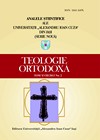Professor Teodor M. Popescu: A Possible Model of Lay Service
Professor Teodor M. Popescu: A Possible Model of Lay Service
Author(s): Ion VicovanSubject(s): Christian Theology and Religion
Published by: Editura Universităţii »Alexandru Ioan Cuza« din Iaşi
Keywords: Theology professor; communist prisons; theological works; loyalty
Summary/Abstract: Prompted by the theme of the tribute year in the Romanian Patriarchate, Saints Constantine and Helen, and taking into account that the two saints were lay persons involved in an exemplary manner in the life of the Church, we consider it necessary and important that we reflect on the way in which the laity nowadays may be engaged in the life of the Church and on the great impact of role models. Consequently, we have chosen as case study an outstanding layman: Professor Teodor M. Popescu. This, on the one hand, as we commemorate 120 years since his birth (1893) and 40 years since his passing away (1973), and on the other hand, due to the fact that he had an outstanding life and wrote works of great value. He was born on the 1st of June 1893 in Boteni, Dâmboviţa County, in the family of priest Marin and Safta Popescu. He completed the first three years of primary school in the neighbouring village, then went to Enache Văcărescu Secondary School of Târgovişte and the Central Seminary in Bucharest (1905-1913). He went to the Faculty of Theology and the university-level Pedagogical Seminary; he received his PhD in Athens. He went on to study in Leipzig, Paris and Sorbonne. At the same time, he attended the courses of the Faculty of Letters and Philosophy. After graduation, he taught at the Central Seminary in Bucharest, and at the Theology Faculties of Kishinev and Bucharest. Accused of offences that he had not committed (legionary activity, acts against the working class and the revolutionary movement, serious libel against USSR etc.), he was imprisoned between 1959 and 1963 in Jilava and Aiud. In prison, he stood out as a remarkable person, enduring with great humility the torments he was subjected to, faithfully keeping his dignity as a good Christian, proving that the lessons he passed on to his students were a personal way of life and creed. After his release, he worked in the Patriarchate (as librarian, reviser of religious books, member of the committee for dialogue of the Romanian Orthodox Church with the Old Catholics, reviewer of foreign church magazines). He authored valuable works, not so much in terms of their number, given the political context, but rather in terms of content. Through his life and work, he remains a role model for all laymen involved in the life and work of the Church.
Journal: Analele Ştiinţifice ale Universităţii »Alexandru Ioan Cuza« din Iaşi. Teologie Ortodoxă
- Issue Year: 2013
- Issue No: 2
- Page Range: 45-62
- Page Count: 18
- Language: English

